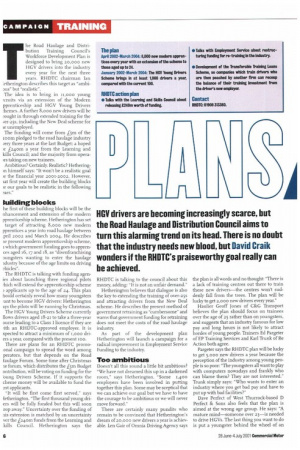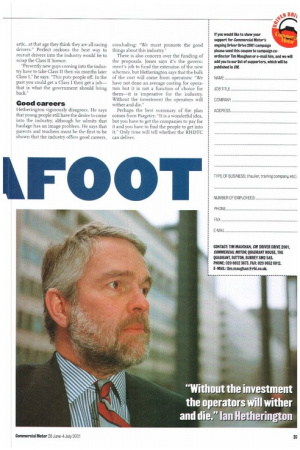HGV drivers are becoming increasingly scarce, but the Road Haulage
Page 36

Page 37

If you've noticed an error in this article please click here to report it so we can fix it.
and Distribution Council aims to turn this alarming trend on its head. There is no doubt that the industry needs new blood, but David Craik wonders if the RHDTC's praiseworthy goal really can be achieved.
1. he Road Haulage and Distribution Training Council's Workforce Development Plan is designed to bring 20,000 new HGV drivers into the industry every year for the next three years. RHDTC chairman Ian :etherington describes this target as "ambiMS" but "realistic".
The idea is to bring in 11,000 young .cruits via an extension of the Modern pprenticeship and HGV Young Drivers liemes. A further 8,000 new drivers will be rought in through extended training for the ier-25s, including the New Deal scheme for Le unemployed.
The funding will come from km of the worn pledged to the road haulage industry very three years at the last Budget: a hoped )ILf240m a year from the Learning and kills Council: and the majority from operaus taking on new trainees.
Ambitious? Certainly. Realistic? Hetheringua himself says: "It won't be a realistic goal ar the financial year 2001-2002. However, rat first year will create the building blocks )r our goals to be realistic in the following .tars."
luilding blocks
he first of these building blocks will be the nhancement and extension of the modern pprenticeship scheme. Hetherington has set target of attracting 8,000 new modern pprentices a year into road haulage between pril 2002 and March 2004. He describes re present modern apprenticeship scheme, i which government funding goes to apprences aged 16, 17 and 18, as "disenfranchising Dungsters wanting to enter the haulage aclustry because of the age limits on driving Ancles".
The RHDTC is talking with funding agenies about launching three regional pilots Thich will extend the apprenticeship scheme ) applicants up to the age of 24. This plan bould certainly reveal how many youngsters 7ant to become HGV drivers: Hetherington ays the pilots will be running by Christmas. The HGV Young Drivers Scheme currently llows drivers aged 18-21 to take a three-year purse leading to a Class I licence if they are rith an RHDTC-approved employer. It is xpected to attract a minimum of r,000 driers a year, compared with the present roo. There are plans for an RHDTC promo.onal campaign to spread the word among perators, but that depends on the Road iaulage Forum. Some time after Christmas Tie forum, which distributes the f5m Budget ontribution, will be voting on funding for the "oung Drivers Scheme. If it supports the cheme money will be available to fund the rst applicants.
"It will be first come first served," says letherington. "The first thousand young driers will be fully funded but this will soon rop away." Uncertainty over the funding of ais extension is matched by an uncertainty ver the f240m funds from the Learning and kills Council. Hetherington says the RHDTC is talking to the council about this money, adding: "It is not an unfair demand."
Hetherington believes that dialogue is also the key to extending the training of over-23s and attracting drivers from the New Deal scheme. He describes the present method of government retraining as "cumbersome" and warns that government funding for retraining does not meet the costs of the road haulage industry.
As part of the development plan Hetherington will launch a campaign for a radical improvement in Employment Service Funding to the industry
Too ambitious
Doesn't all this sound a little bit ambitious? "We have not dreamed this up in a darkened room," says Hetherington. Some 1,400 employers have been involved in putting together this plan. Some may be sceptical that we can achieve our goal but we have to have the courage to be ambitious or we will never move forward."
There are certainly many pundits who remain to be convinced that Hetherington's dream of 2 o,000 new drivers a year is achievable. Len Gait of Omnia Driving Agency says the plan is all words and no thought: "There is a lack of training centres out there to train these new drivers—the centres won't suddenly fall from the trees. The plan will be lucky to get 2,000 new drivers every year."
Haulier Geoff Jones of C&G Transport believes the plan should focus on trainees over the age of 25 rather than on youngsters, and suggests that an industry famous for low pay and long hours is not likely to attract hordes of young people. Trainers Ed Pargeter of EP Training Services and Karl Trunk of Re Action both agree.
Pargeter says the RHDTC plan will be lucky to get 5,000 new drivers a year because the perception of the industry among young people is so poor: "The youngsters all want to play with computers nowadays and frankly who can blame them? They are not interested." Trunk simply says: "Who wants to enter an industry where you get bad pay and have to put up with bad facilities?"
Dave Perfect of West Thurrock-based D Perfect 8, Sons also feels that the plan is aimed at the wrong age group. He says: "A mature mind—someone over 23—is needed to drive H GVs. The last thing you want to do is put a youngster behind the wheel of an
artic...at that age they think they are all racing drivers." Perfect reckons the best way to recruit drivers into the industry would be to scrap the Class II licence.
"Presently new guys coming into the industry have to take Class II then six months later Class I," he says. "This puts people off. In the past you could get a Class I then get a job— that is what the government should bring back,"
Good careers
Hetherington vigorously disagrees. He says that young people still have the desire to come into the industry, although he admits that haulage has an image problem. He says that parents and teachers must be the first to be shown that the industry offers good careers, concluding: "We must promote the good things about this industry."
There is also concern over the funding of the proposals. Jones says it's the government's job to fund the extension of the new schemes, but Hetherington says that the bulk of the cost will come from operators: "We have not done an average costing for operators but it is not a function of choice for them—it is imperative for the industry. Without the investment the operators will wither and die."
Perhaps the best summary of the plan comes from Pargeter: "It is a wonderful idea, but you have to get the companies to pay for it and you have to find the people to get into it." Only time will tell whether the RHDTC can deliver.








































































































